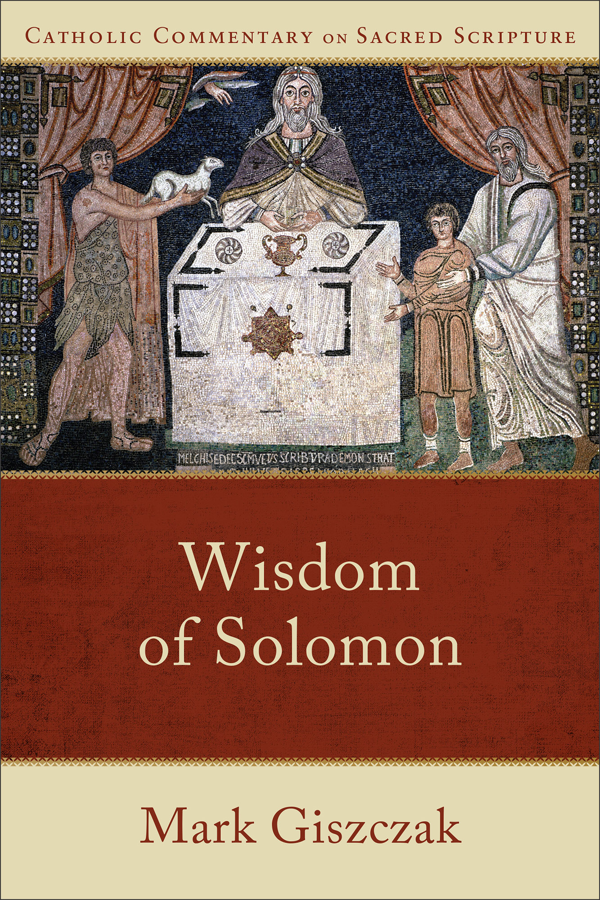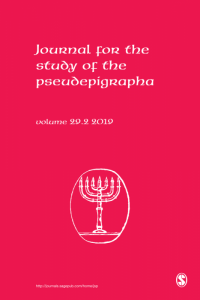
Wisdom of Solomon Commentary
I am very happy to announce that my new book is available for pre-order. This commentary on the Wisdom of Solomon is the first volume of the Old Testament series of the Catholic Commentary on Sacred Scripture from Baker Academic.
Catholic Commentary on Sacred Scripture
The CCSS series has been valuable for teaching and research on the New Testament since the first volume on the Gospel of Mark by Mary Healy came out in 2008. Since that time the CCSS series has offered a total of 17 volumes, covering all the books of the New Testament. Peter Williamson and Mary Healy asked me to join the editorial team for the Old Testament series back in 2019. We have been working hard since then to bring out commentaries that will deliver a serious, scholarly, yet pastoral and accessible Catholic theological reading of the biblical text. We have recruited a great team of authors and are very happy to share this volume as the firstfruits of the OT series. Know that more volumes are coming as we continue writing and editing!
Why Write on Wisdom?
The Wisdom of Solomon is in one of the most overlooked books of the Bible. As a deuterocanonical book, it is not in the Protestant canon and so only Catholic, Orthodox and Anglican scholars (and some Lutherans) would think of it as Scripture. As an Old Testament book, it is an outlier since it was originally written in classical Greek. In terms of Greek, it is an outlier because it uses very rare vocabulary words. In terms of doctrine, it combines Hebrew doctrine with Greek philosophy, so it is not a favored topic of biblical scholars looking for the unique contribution of the Hebrew tradition. In terms of timeline, it is likely the very last book of the Old Testament to be composed. And in terms of resources in English, very little has been published on it. The last full-length English commentary was David Winston’s 1979 Anchor Bible volume (and fortunately, that has been added to by the Italian–and now translated–volume by Luca Mazzinghi in the IECOT series from Kohlhammer Verlag in 2019). I’ve posted before about how few resources are available on Wisdom of Solomon in English. To me, it was important to make a unique contribution that would help people read and understand this valuable book of the Bible. To that end, you might have noticed my name on the Ignatius Study Bible booklet on Wisdom. But this commentary is a much more complete treatment.
What is Wisdom of Solomon About?
The book of Wisdom or “Wisdom of Solomon” is an unusual book. Having read Proverbs and Sirach, you might expect it to be full of one-liner aphorisms, but it’s not. It takes up a different approach to talking about the pursuit of wisdom that is more reminiscent of Ecclesiastes, albeit in a Hellenistic Jewish mode. The author, who lived in Alexandria, attempts to fuse together Jewish appreciation of Torah and salvation history with a Greek philosophical approach to life. He addresses his work to “kings and rulers” and invites his audience to pursue Wisdom. But the book unfolds as a series of exhortations, vignettes, quests and symbolic narratives. The author speaks with the voice of Solomon (at least in chaps. 6-9), but is not actually Solomon, who died centuries earlier. However, the author sees Solomon as representative of an ideal life, of the pursuit of wisdom as the goal of life. By “loving righteousness” and honoring wisdom, one finds the path to God. So Wisdom of Solomon is about the quest for wisdom.
What is the Commentary’s Approach?
If you are familiar with the New Testament volumes of the CCSS series, you’ll know the approach. It is highly focused on the text–presenting the text of each passage with cross-references, Lectionary references and Catechism references. Then each verse or passage is discussed in paragraph form, with many quotations of Wisdom and other biblical passages. We have included Biblical Background sidebars that explain certain topics not directly treated in body text–topics like “The Devil’s Envy,” “Aristobulus,” and “Immortality in the Old Testament.” Also, we have included Living Tradition sidebars that offer quotations from major Christian writers on certain special topics such as “St. Irenaeus on Adam’s Salvation,” St. Augustine on Sevenfold Gifts and Sevenfold Evils.” The commentary includes a glossary of key terms. The hope is to explain the meaning of each passage in the Wisdom of Solomon with clarity, aware of the historical background, the literary techniques the writer is using and the tradition of the Catholic Church. The commentary is addressed to the educated general reader and will be accessible to priests, catechists, theology students, Bible study leaders and avid Bible readers. I hope that readers of the commentary will come to love the Wisdom of Solomon as I have!
Where to Buy
If you are interested in picking up a copy of this new resource, you can find available for pre-order it at these sites:
- Baker Academic: https://bakeracademic.com/p/Wisdom-of-Solomon-Mark-Giszczak/542807
- Amazon: https://a.co/d/a91Ukha
- Verbum (for the electronic edition): https://verbum.com/product/252803/wisdom-of-solomon
When Will It Arrive?
The book is in production now and is set to be released on February 13, 2024. Perhaps it will make a great Valentine’s Day gift! 🙂
I hope that you will enjoy the book and that it will lead you into a deeper study of the Sacred Page. As we continue to work on the Old Testament series of the CCSS, I am hoping that many people will find these commentaries to be useful, inspiring and enjoyable.





